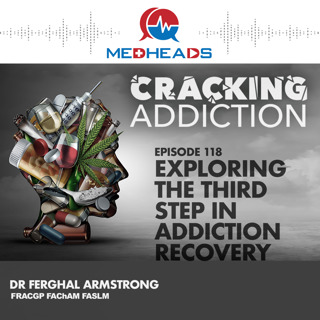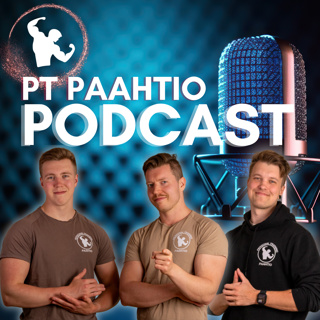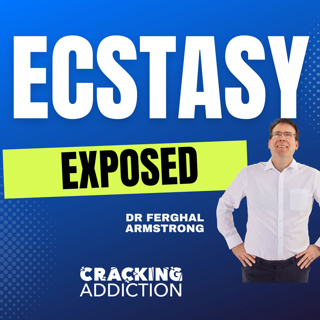
What Really Happens To Your Body On Ecstasy?
What Really Happens To Your Body On Ecstasy?Curious about the real truth behind Ecstasy (MDMA)? Think it’s a “safe party drug”? Think again! In this eye-opening episode of Cracking Addiction, Dr. Ferghal Armstrong dives deep into everything you need to know about ecstasy—from its detailed pharmacology, shocking side effects, and hidden dangers to its emerging use in PTSD treatment research.Dr. Armstrong breaks down the science behind ecstasy’s effects, explaining how its chemical cousins like PMA and PMMA can increase the risk of fatal overdose—sometimes with just one pill. You’ll learn about the difference between street names like “Molly”, “XTC”, and “Beans”, and why what you think you’re taking might be far more dangerous than it seems. Discover how these drugs impact the brain, causing potentially life-threatening problems such as serotonin syndrome, hyperthermia, hyponatremia, and even psychosis or severe depression days after use.The episode explores why ecstasy produces feelings of empathy, heightened sensory experiences, and emotional connection, but also why it can lead to erectile dysfunction and a dreaded “ecstasy hangover.” Special attention is given to gender differences—did you know women face unique risks, including much higher chances of serious complications?If you’re concerned about party drugs, fascinated by psychopharmacology, or care about your mental health and the safety of your friends, this is a must-watch! Keywords like MDMA dangers, ecstasy overdose, serotonin syndrome, party drug risks, stimulant toxicity, PTSD research, MDMA side effects, raves, pill testing, harm reduction are all tackled with clarity and compassion.
23 Huhti 12min
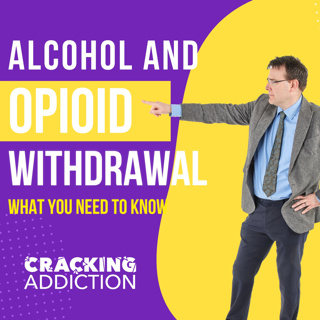
Alcohol and Opioid Withdrawal: What You Need to Know
Have you ever wondered about the difference between alcohol withdrawal and drug withdrawal? In this episode, Dr. Ferghal Armstrong breaks down alcohol withdrawal vs drug withdrawal, shedding light on the unique signs and timelines of each.Explore the world of intoxication and withdrawal—from pinpoint pupils in opioid intoxication to cerebellar signs in alcohol intoxication. Learn to recognize the symptoms of alcohol withdrawal, including seizures, hallucinations, autonomic hyperarousal, delirium tremens, insomnia, and agitation. Discover how these differ from opioid withdrawal, which presents with flu-like symptoms, yawning, and anxiety.Dr. Armstrong walks you through the alcohol withdrawal timeline, compares it to opioid withdrawal, and explains the neurobiology behind neuroexcitation and psychiatric arousal. This is essential knowledge for understanding substance use, whether you're a health professional or simply curious about the human brain.This video also touches on the role of medications like benzodiazepines and tramadol, and how respiratory depression can be a critical concern in certain types of intoxication.00:00:00 Introduction to Intoxication and Withdrawal00:00:50 Intoxication: Pupils and Seizures00:02:37 Intoxication and Bowel Sounds00:03:37 Alcohol and Opioid Intoxication Differences00:03:37 Withdrawal: General Phenomena00:04:27 Alcohol vs. Opioid Withdrawal00:05:16 Summary and Conclusion
17 Huhti 5min
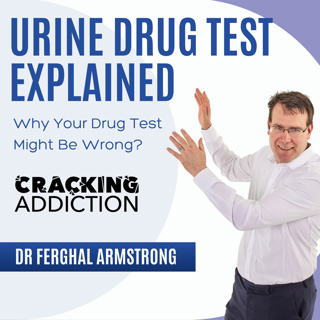
Urine Drug Test Explained - Why Your Drug Test Might Be Wrong?
Ever wondered how a urine drug test really works—or how some people try to beat the system? This is the ultimate guide you've been searching for! In this compelling video, I dive deep into the fascinating world of urine drug testing, breaking down the science, procedures, and myths behind it all.From the urine drug test collection procedure to the detection windows for substances like cannabis, cocaine, opiates, and alcohol metabolites, we cover everything you need to know. You'll learn why urine is one of the most commonly used biological samples, thanks to its higher drug metabolite concentrations and longer detection periods.Curious about how to pass a drug test? I reveal the common tactics people use in an attempt to fool the system—like diluting samples, using synthetic urine, or detox kits—and explain why most of them don’t work.We also explore the Australian guidelines for urine drug screening, look at the differences between screening and confirmatory testing, and discuss which substances might evade a standard drug test.Whether you're fascinated by forensics, involved in healthcare, or just curious about drug testing, this video is packed with insights. Don't miss it!00:00:00 Introduction to Urine Drug Screening00:01:01 Biological Substrates for Drug Testing00:02:16 Detection Windows for Common Drugs00:04:07 Screening vs. Confirmatory Testing00:05:47 GCMS and LCMS Testing00:06:33 Legally Defined Cutoff Levels in Australia00:09:09 Drugs Not Detected on Standard Panels00:10:16 Errors and Cross-Reactivity in Drug Testing00:11:58 False Negatives and Evasion Techniques00:12:43 Adulteration and Evasion Techniques00:14:32 Health Risks of Adulteration00:16:33 Individual Patient Factors00:17:37 Urine Collection and Observed Testing Guidelines00:18:48 Conclusion
11 Huhti 19min

Cocaine Withdrawal Timeline And Treatment Facts You NEED To Know!
Curious about what cocaine withdrawal feels like? In this video, We break down everything you need to know about tackling the tough but manageable cocaine withdrawal journey. Join Dr Ferghal Armstrong for an engaging and insightful discussion as I explore the phases of cocaine withdrawal, their psychological effects, and practical tips to navigate each stage with confidence.We’ll cover the initial crash phase, the intense withdrawal phase, and the final extinction phase, giving you a clear picture of what to expect during recovery. I’ll also share key strategies to ease cocaine withdrawal symptoms, including psychoeducation, proper nutrition, and sleep hygiene—tools that can make all the difference in managing this process effectively. 00:00:00 Introduction and Disclaimer00:00:46 Cocaine Withdrawal Overview00:01:54 Cocaine Withdrawal Timeline00:03:11 Managing Cocaine Withdrawal00:04:19 Diazepam Use in Withdrawal00:06:21 Supportive Medications00:07:19 Discharge Planning00:08:32 Relapse Prevention Strategies00:09:47 Pharmacotherapy Options00:10:42 Relapse Rates and Prognosis00:13:11 Conclusion on Recovery Prospects
3 Huhti 13min
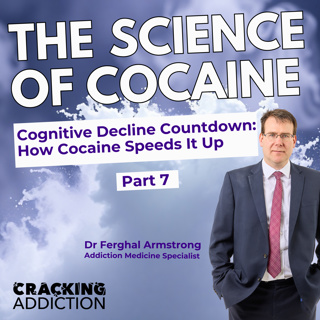
Cognitive Decline Countdown: How Cocaine Speeds It Up
Cognitive Decline Countdown: How Cocaine Speeds It Up.Dr. Ferghal Armstrong sheds light on the profound cognitive decline associated with long-term cocaine use, unraveling the mystery behind cocaine’s neuroanatomy mechanisms and their impact on everyday life. Discover how chronic cocaine use, a form of drug abuse, leads to cognitive impairments such as attention deficits, impaired executive functioning, and emotional dysregulation—all stemming from dysfunctions in the brain's neurobiological systems. This video dives deep into the toll of addiction, particularly drug addiction, on mental health.In this enlightening discussion, Dr. Armstrong explores key brain regions like the prefrontal cortex and the hippocampus, explaining the complex interplay of neurotransmitters like dopamine and glutamate in chronic cocaine users. While cocaine takes center stage, parallels are drawn to other forms of addiction, such as opioid addiction, to highlight shared mechanisms of harm. Unveil the truths about structural brain changes, oxidative stress, and real-world implications like occupational impairment and disrupted relationships. This discussion is crucial for anyone journeying towards understanding substance use disorder or supporting someone in recovery from the grips of drug addiction.
27 Maalis 18min
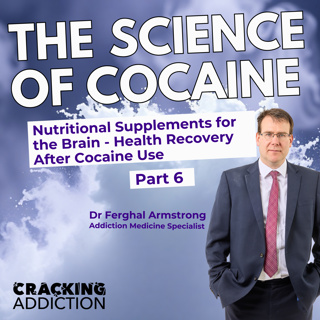
Nutritional Supplements for the Brain - Health Recovery After Cocaine Use
Are you concerned about brain health after cocaine use? You’re not alone. This video explores how nutritional supplements can speed up recovery from cocaine addiction and cocaine withdrawal. Want to know how to support your brain? Keep watching.B vitamins (B6, B9, B12) lower homocysteine levels and boost neurotransmitter production for better memory and mental health. I share exact dosages and warn about risks, like too much B6. Antioxidants like vitamin E and C, plus polyphenols (resveratrol, curcumin, EGCG), shield neurons from damage and fight brain fog. Omega-3 fatty acids improve optimal mind performance.00:00:00 Introduction to Nutritional Supplementation for Brain Health00:01:03 The Role of B Vitamins in Brain and Cardiac Health00:02:02 Vitamin B6 Dosage and Risks00:03:04 Vitamin B12 Absorption Issues and Treatment00:04:18 Antioxidants: Vitamin E and C for Neural Protection00:05:09 Dosing and Risks of Antioxidant Supplementation00:05:58 Polyphenols: Resveratrol, Curcumin, and EGCG00:07:02 Importance of Minerals: Magnesium, Zinc, and Selenium00:08:01 Omega 3 Fatty Acids for Neuroprotection and Cardiac Health00:09:03 Summary and Cautions on Supplement Use and Toxicity
19 Maalis 9min
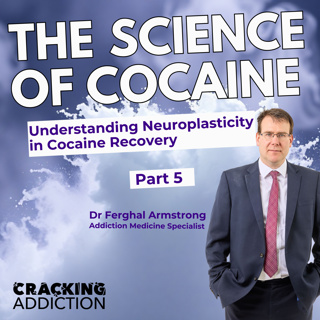
Healing the Brain Post-Addiction: Understanding Neuroplasticity in Cocaine Recovery
Healing the Brain Post-Addiction: Understanding Neuroplasticity in Cocaine Recovery.Is your brain crying out for recovery from chronic cocaine use? If you're ready to embark on a transformative journey toward healing the brain post-addiction, this episode is your ticket to reclaiming your life. We delve deep into the brain's remarkable ability to repair itself through neuroplasticity, even after the damage caused by drug addiction.How can the brain bounce back? Let me guide you through the mind-bending concepts of synaptic remodelling, glutamate homeostasis, and neurogenesis—all crucial for addiction recovery. We’ll unwrap the keys to enabling your brain’s miraculous healing, focusing on how the brain rewires itself for better decision-making, impulse control, and motivation.The road to recovery doesn’t stop at abstinence. Mental health plays a vital role in cocaine addiction recovery, and we’ll explore how interventions like aerobic exercise, mindfulness, therapy, and targeted nutritional strategies can support both cognitive and structural healing.If you're searching for real, science-backed insights into addiction recovery, this episode will give you a powerful look at how the brain regenerates and how you can take an active role in your healing journey.🔔 Subscribe for more expert discussions on addiction, neuroplasticity, and mental health!00:00:00 Introduction to cocaine recovery and neuroplasticity 00:00:54 Mechanisms of neuroplasticity in cocaine recovery 00:01:53 Synaptic remodeling and receptor recovery 00:02:53 Glutamate homeostasis restoration 00:03:42 Stages of brain healing post cocaine use 00:04:21 Acute withdrawal stage 00:05:12 Early recovery stage 00:06:10 Midterm recovery stage 00:06:52 Long term recovery stage 00:08:20 Cognitive, structural, and functional recovery patterns 00:09:56 Factors influencing recovery speed 00:10:46 Interventions that promote recovery 00:11:48 Negative factors affecting brain recovery 00:12:33 Conclusion and final thoughts
12 Maalis 12min
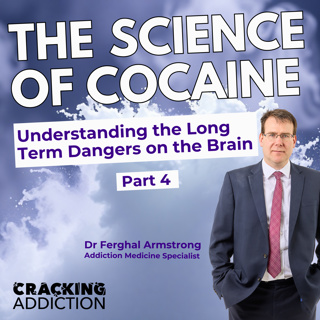
How Does Cocaine Permanently Change Your Brain Structure?
If you've ever wondered how cocaine impacts cognitive function, emotional regulation, and the relentless cycle of addiction, then you're in the right place. Witness how cocaine wreaks havoc on the prefrontal cortex, amygdala, hippocampus, and more, leading to devastating memory deficits, decision-making impairments, and risk of psychosis.Join us in exploring the grim reality of cocaine's influence on brain structure, including gray matter reduction and dopamine receptor loss, revealed through advanced neuroimaging studies. The revelations of how these changes manifest in everyday life— from blunted pleasure to heightened anxiety and stress sensitization— will leave you astounded.Chapters00:00:00 Introduction and Recap on Previous Episode00:00:35 Neuroanatomical Damage from Chronic Cocaine Use00:01:30 Cardiovascular Effects and Stroke Risks00:02:38 Neurochemical Imbalances and Neurotransmitter Dysregulation00:03:42 Psychological Impairments from Chronic Cocaine Use00:04:38 Emotional Dysregulation and Increased Impulsivity00:05:44 Structural Brain Changes in Chronic Cocaine Users00:06:38 Long Term Recovery Challenges00:07:40 Conclusion and Final Thoughts
6 Maalis 8min
